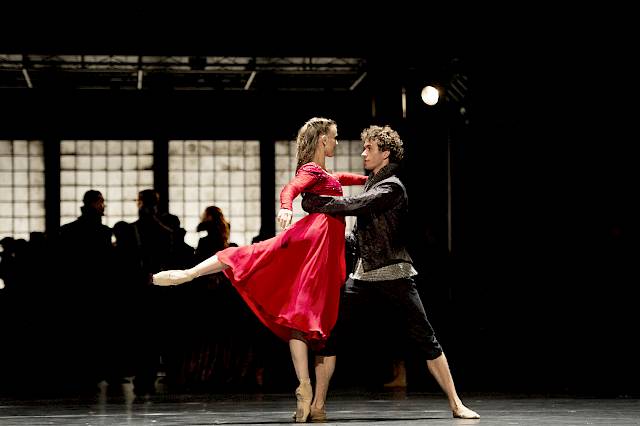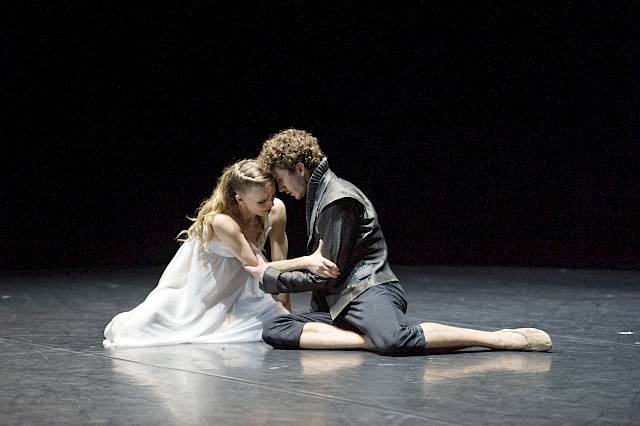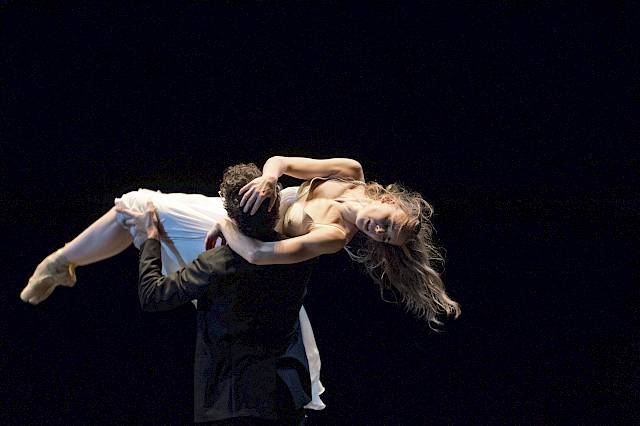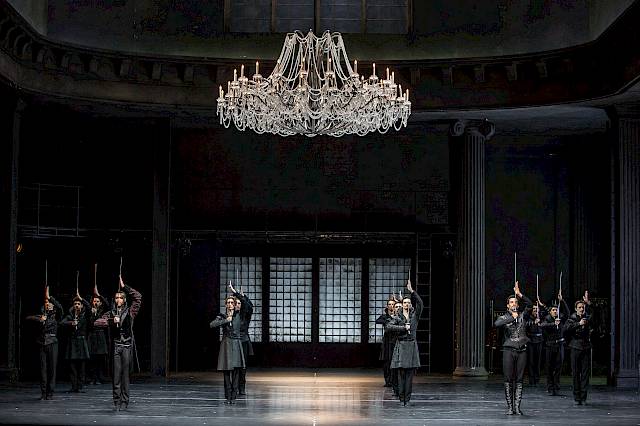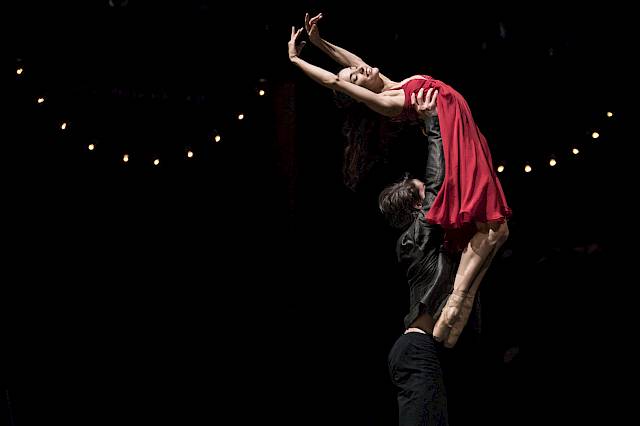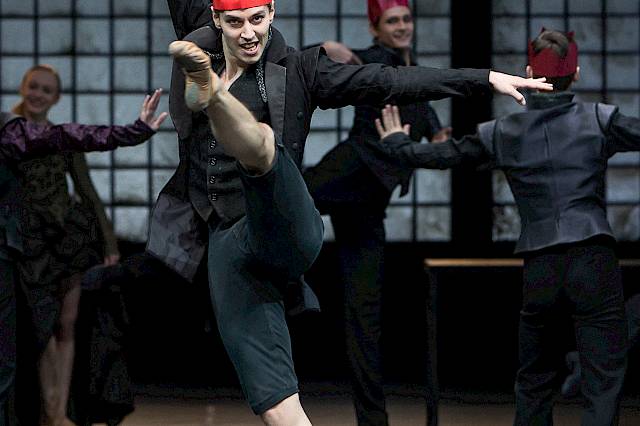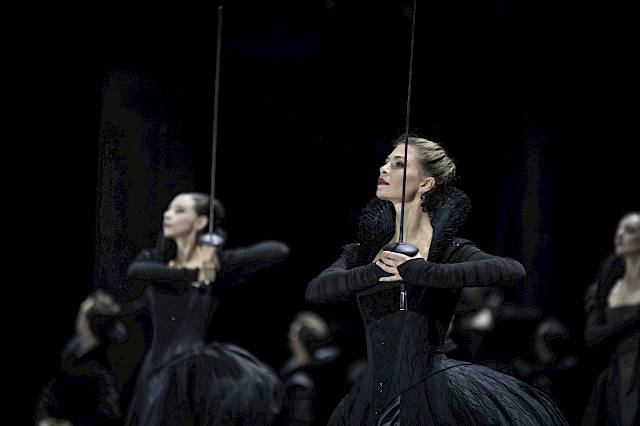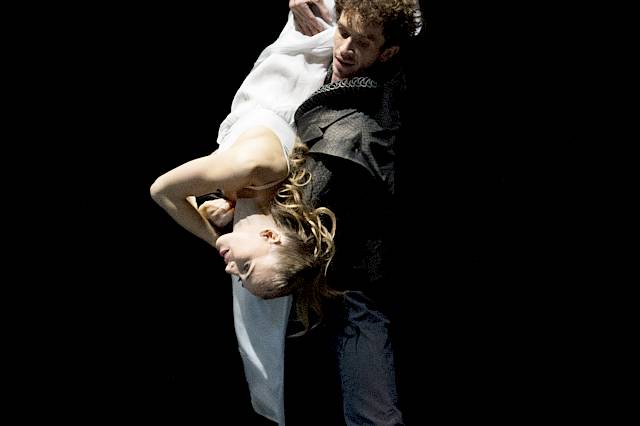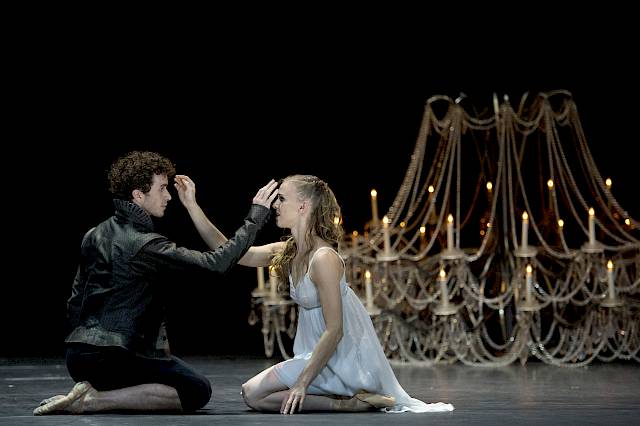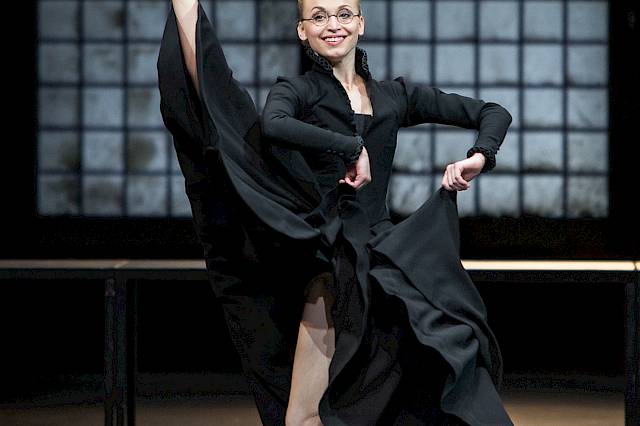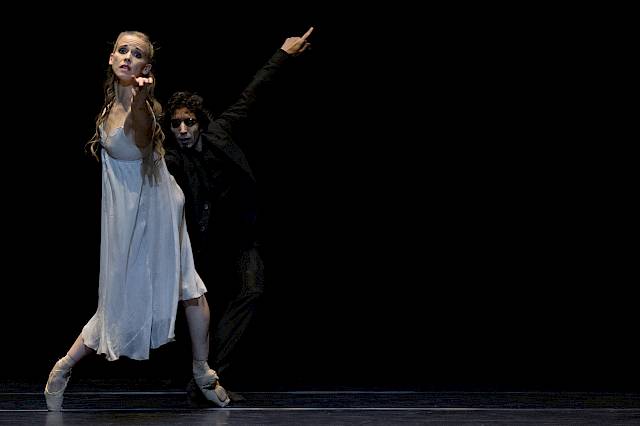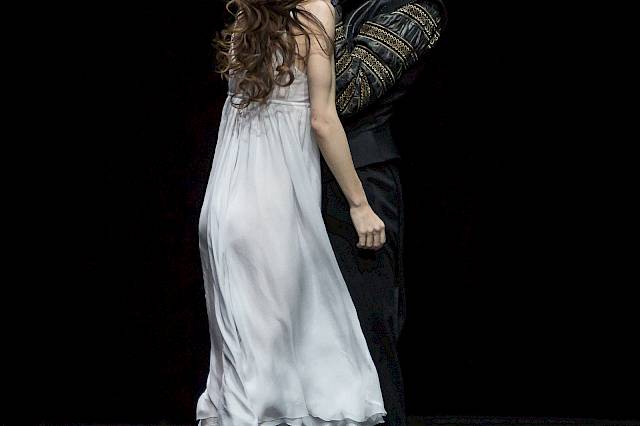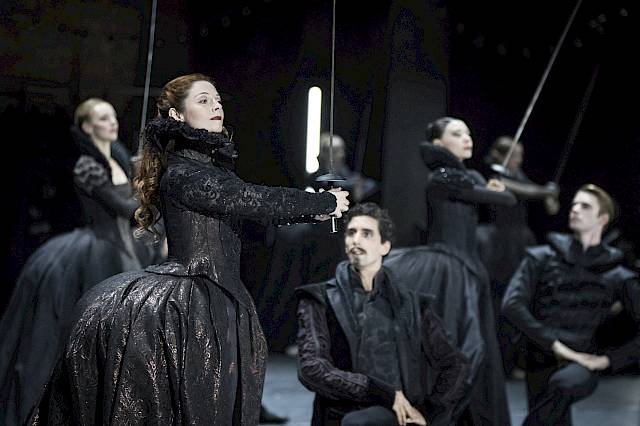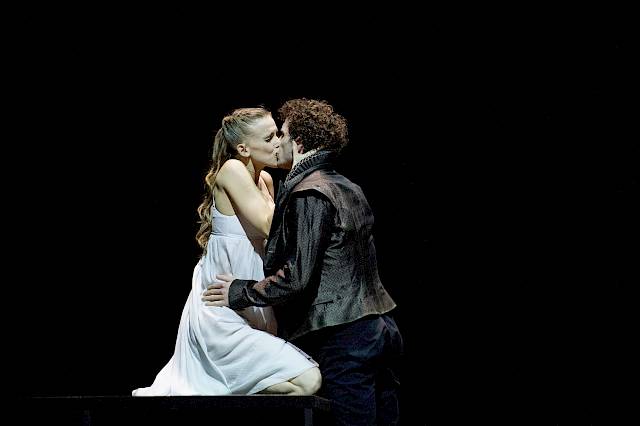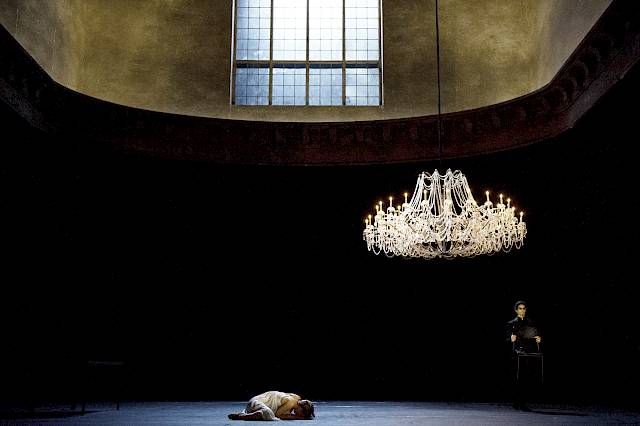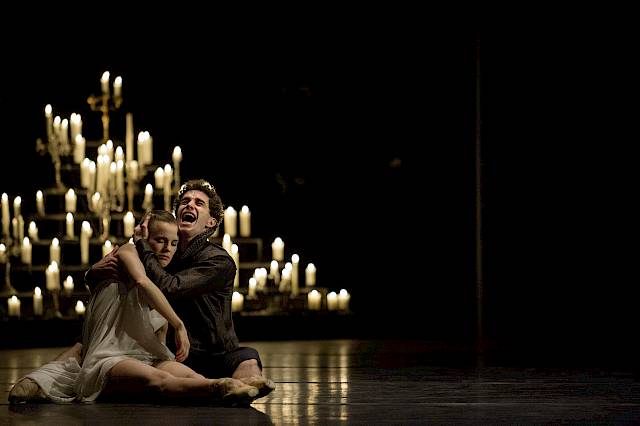Romeo und Julia
Ballet by Christian Spuck
In three acts after the tragedy by William Shakespeare
Music von Sergei Prokofiev (1891-1953)
Duration 2 H. 30 Min. incl. intermission after 2nd act after approx. 1 H. 20 Min. Introduction 45 min before the performance.
Past performances
April 2016
June 2016
Good to know
Romeo und Julia
Synopsis
Romeo und Julia
Erster Akt
Die beiden Familien Capulet und Montague sind seit Generationen verfeindet. Wo immer sie und ihre Anhänger sich begegnen, kommt es zu Provokationen und oft tödlich endendem Streit. Angeführt werden die jungen Capulets vom edlen Tybalt, bei den Montagues sind es die unzertrennlichen Freunde Romeo, Mercutio und Benvolio. Die immer heftiger werdenden Auseinandersetzungen der beiden Parteien fordern ständig neue Opfer. Julia, die Tochter der Capulets, vergnügt sich gemeinsam mit ihrer Amme und ihren Freundinnen. Julias Eltern planen die Hochzeit ihrer Tochter mit dem jungen Grafen Paris, der bei einem abendlichen Ball im Hause Capulet um ihre Hand anhalten soll. Von ihrer Mutter erhält Julia ihr erstes Ballkleid. Die drei Montagues Romeo, Mercutio und Benvolio schleichen sich maskiert auf das Fest der Capulets. Dort trifft Julia erstmals auf den Grafen Paris und wird wenig später auf Romeo aufmerksam. Beide verlieben sich auf den ersten Blick. Tybalt erkennt in Romeo einen der verhassten Montagues. Er versucht eine Auseinandersetzung zu provozieren, wird aber von Julias Vater daran gehindert. Romeo und seine Freunde verlassen das Fest. Noch in derselben Nacht zieht es Romeo zurück zu Julia. Beide gestehen sich ihre Liebe.
Zweiter Akt
Bei einem Fest überbringt die Amme in Julias Auftrag einen Brief für Romeo, in dem sie ihn bittet, sich zum Pater Lorenzo zu begeben. Im Beisein der Amme werden Romeo und Julia von Pater Lorenzo getraut. Romeo begibt sich erneut auf das Fest, wo er nicht nur von seinen Freunden, sondern auch von Tybalt erwartet wird. Romeo will einem neuerlichen Streit mit ihm aus dem Weg gehen. Die Situation eskaliert, als Mercutio Tybalt provoziert und im Zweikampf von ihm getötet wird. Um den Tod seines Freundes zu rächen, fordert Romeo Tybalt heraus und verwundet ihn tödlich im Duell. Gräfin Capulet trauert um ihren Neffen und schwört Romeo und den Montagues blutige Rache.
Dritter Akt
Romeo und Julia haben die Nacht miteinander verbracht. Pater Lorenzo und die Amme drängen Romeo zur Flucht vor seinen Verfolgern. Julia lehnt es ab, den Grafen Paris zu heiraten, und wird deshalb von ihren Eltern mit Vorwürfen überhäuft. In ihrer Verzweiflung wendet sich Julia erneut an Pater Lorenzo. Er gibt ihr einen Schlaftrunk, um den Anschein zu erwecken, sie sei gestorben und so ihre Flucht zu ermöglichen. Gegenüber ihren Eltern gibt Julia vor, in die Heirat mit Graf Paris einzuwilligen. Allein gelassen, nimmt sie den Trank zu sich, der sie in einen todesähnlichen Schlaf versetzt. Am nächsten Morgen finden ihre Eltern und Paris die vermeintlich Tote.
Vierter Akt
Julia wird von ihren trauernden Angehörigen beigesetzt. Romeo hat von Julias Tod erfahren und glaubt die schreckliche Nachricht. An Julias Grab wählt er den Freitod. Julia erwacht in dem Moment, da ihr Geliebter stirbt. Sie ersticht sich mit seinem Dolch.
Biographies
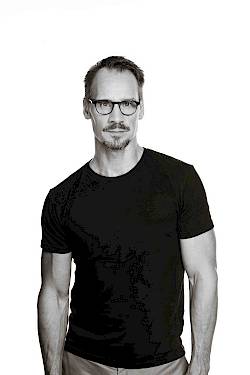
Christian Spuck,
Christian Spuck
Christian Spuck stammt aus Marburg und wurde an der John Cranko Schule in Stuttgart ausgebildet. Seine tänzerische Laufbahn begann er in Jan Lauwers’ Needcompany und Anne Teresa de Keersmaekers Ensemble «Rosas». 1995 wurde er Mitglied des Stuttgarter Balletts und war von 2001 bis 2012 Hauschoreograf der Compagnie. In Stuttgart kreierte er fünfzehn Uraufführungen, darunter die Handlungsballette Lulu. Eine Monstretragödie nach Frank Wedekind, Der Sandmann und Das Fräulein von S. nach E.T.A. Hoffmann. Darüber hinaus hat Christian Spuck mit zahlreichen namhaften Ballettcompagnien in Europa und den USA gearbeitet. Für das Königliche Ballett Flandern entstand 2006 The Return of Ulysses, beim Norwegischen Nationalballett Oslo wurde Woyzeck nach Georg Büchner uraufgeführt. Das Ballett Die Kinder beim Aalto Ballett Essen wurde für den «Prix Benois de la Danse» nominiert, das ebenfalls in Essen uraufgeführte Ballett Leonce und Lena nach Georg Büchner wurde von den Grands Ballets Canadiens de Montréal, dem Charlotte Ballet, USA, dem Tschechischen Nationalballett Prag und vom Stuttgarter Ballett übernommen. Die Uraufführung von Poppea//Poppea für Gauthier Dance am Theaterhaus Stuttgart wurde 2010 von der Zeitschrift «Dance Europe» zu den zehn erfolgreichsten Tanzproduktionen weltweit gewählt sowie mit dem deutschen Theaterpreis Der Faust 2011 und dem italienischen «Danza/Danza-Award» ausgezeichnet. Christian Spuck hat auch Opern inszeniert: Auf Glucks Orphée et Euridice an der Staatsoper Stuttgart folgten Verdis Falstaff am Staatstheater Wiesbaden sowie Berlioz’ La Damnation de Faust und Wagners Fliegender Holländer an der Deutschen Oper Berlin. Von 2012 bis 2023 war Christian Spuck Direktor des Balletts Zürich. Hier waren seine Choreografien Romeo und Julia, Leonce und Lena, Woyzeck, Der Sandmann, Messa da Requiem, Nussknacker und Mausekönig, Dornröschen und Monteverdi zu sehen. Das 2014 in Zürich uraufgeführte Ballett Anna Karenina nach Lew Tolstoi wurde in Oslo, am Moskauer Stanislawski-Theater, vom Koreanischen Nationalballett und vom Bayerischen Staatsballett ins Repertoire übernommen. 2018 hatte in Zürich Spucks Ballett Winterreise Premiere, für das er mit dem «Prix Benois de la Danse 2019» ausgezeichnet wurde. 2019 folgte beim Ballett Zürich Helmut Lachenmanns Das Mädchen mit den Schwefelhölzern (Auszeichnung als «Produktion des Jahres und Kompanie des Jahres für das Ballett Zürich durch die Zeitschrift tanz). Für das Moskauer Bolschoitheater kreierte er 2021 sein Ballett Orlando nach Virginia Woolf. Spucks Messa da Requiem wurde nicht nur zum Adelaide Festival nach Australien eingeladen, sondern auch vom Het Nationale Oper & Ballet Amsterdam und vom Finnischen Nationalballett übernommen. Seit Beginn der Saison 2023/24 ist Christian Spuck Intendant des Staatsballetts Berlin.
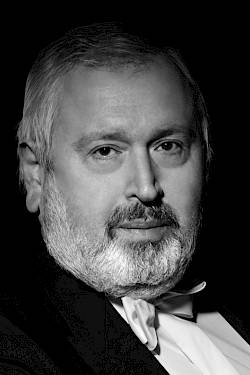
Michail Jurowski,
Michail Jurowski
Michail Jurowski studierte am Moskauer Konservatorium bei Leo Ginsburg und Alexej Kandinsky und wurde im Alter von 25 Jahren Assistent von Gennadi Roshdestwensky beim Grossen Symphonieorchester des Staatlichen Rundfunks und Fernsehens in Moskau. 1989 übersiedelte er aufgrund einer Einladung der Semperoper Dresden nach Deutschland und wurde 1990 Musikdirektor und ständiger Gastdirigent der Nordwestdeutschen Philharmonie Herford. Von 1999 bis 2001 war er Chefdirigent an der Oper Leipzig. Er ist ständiger Gastdirigent des Rundfunk-Sinfonieorchesters Berlin, der Deutschen Oper Berlin, des Tonkünstlerorchesters Wien, des Odense Symphony Orchestra und des Norrköping Symphony Orchestra. Von 2006 bis 2008 war er Chefdirigent des WDR-Rundfunkorchesters Köln. Höhepunkte seiner Operntätigkeit waren Sir Peter Ustinovs Produktion «Iolanthe» und Rachmaninows Francesca da Rimini bei den Dresdner Musikfestspielen, Boris Godunow an der Deutschen Oper Berlin, Schostakowitschs Nase an der Oper Leipzig und Prokofjews Die Liebe zu den drei Orangen an der Komischen Oper Berlin, Parsifal am Teatro Carlo Felice in Genua, Tosca, La traviata und Die Zarenbraut an der Oper Frankfurt, Götterdämmerung in Dortmund, Tschaikowskis Dornröschen in Oslo sowie Respighis Marie Victoire, Un ballo in maschera und Rienzi an der Deutschen Oper Berlin. Am Opernhaus Zürich dirigierte er Glasunows Raymonda.
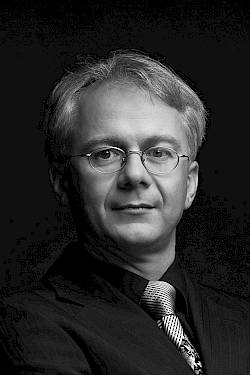
Pavel Baleff,
Pavel Baleff
Pavel Baleff ist Chefdirigent der Philharmonie Baden-Baden. Engagements als Opern- und Konzertdirigent führten ihn u.a. an das Zürcher Opernhaus, die Dresdner Semperoper, das Leipziger Gewandhaus, die Hamburgische Staatsoper, das Bolschoi Theater Moskau, die Oper Montpellier, zum Dänischen Nationalorchester, zum Mozarteum Orchester Salzburg sowie zu den Rundfunksinfonieorchestern des WDR und des BR. Er leitete Aufführungen, Fernsehaufzeichnungen und CD-Produktionen mit international renommierten Solisten wie Krassimira Stoyanova, Diana Damrau, Edita Gruberova und Vesselina Kasarova, Ramón Vargas, Anne-Sophie Mutter, Anna Netrebko, Thomas Hampson, Piotr Beczala und Luca Pisaroni. Seine CD-Produktionen mit der Sopranistin Krassimira Stoyanova und dem Münchner Rundfunkorchester wurden 2012 und 2014 mit dem Jahrespreis der Deutschen Schallplattenkritik und dem International Classic Music Award prämiert. Anlässlich der von ihm geleiteten Ersteinstudierung des Ring des Nibelungen in Bulgarien an der Nationaloper in Sofia wurde er zum bulgarischen «Dirigenten des Jahres» gewählt. 2016 debütierte er an der Wiener Staatsoper mit L’elisir d’amore und 2017 an der Staatsoper Stuttgart mit Romeo und Julia. Am Opernhaus Zürich dirigierte er in jüngster Zeit Schwanensee sowie die beiden Opern von Ravel L’Heure Espagnole und L’Enfant et les sortilèges. Pavel Baleff ist 1. Preisträger beim Carl-Maria-von-Weber-Wettbewerb in München sowie beim Internationalen Bad Homburger Dirigentenwettbewerb, wurde in das Dirigentenforum des Deutschen Musikrates aufgenommen und erhielt eine Auszeichnung durch die Herbert von Karajan Stiftung.
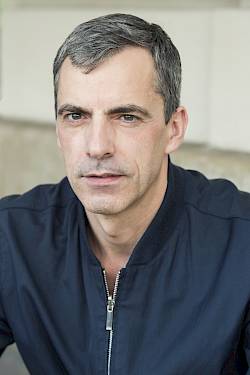
Christian Schmidt,
Christian Schmidt
Christian Schmidt studierte Bühnenbild bei Erich Wonder an der Wiener Akademie der Bildenden Künste. 1992 arbeitete er zum ersten Mal mit Claus Guth zusammen, woraus sich eine intensive künstlerische Partnerschaft entwickelte. Zahlreiche Inszenierungen Guths hat er mittlerweile als Bühnen- und Kostümbildner ausgestattet, darunter Iphigénie en Tauride und Le nozze di Figaro (Salzburger Festspiele), Der fliegende Holländer (Bayreuther Festspiele), Fierrabras, Radamisto, Ariane et Barbe-Bleue, Tristan und Isolde und Parsifal für das Opernhaus Zürich sowie Mozarts Lucio Silla (Wiener Festwochen). Auch durch Uraufführungen hat sich das Team einen Namen gemacht, darunter Czernowins Pnima und Stauds Berenice für die Münchener Biennale, Ruzickas Celan in Dresden, Oehrings Unsichtbar Land in Basel und Czernowins Heart Chamber an der Deutschen Oper Berlin. Für Hans Neuenfels’ Inszenierungen von Zemlinskys Der König Kandaules an der Wiener Volksoper (1997) und Die Entführung aus dem Serail in Stuttgart (1998) entwarf Schmidt die Ausstattung (Auszeichnung «Inszenierung des Jahres» durch die «Opernwelt»). 2003 kürte ihn die «Opernwelt» zum «Bühnenbildner des Jahres», 2005 zum «Kostümbildner des Jahres». Für das Bühnenbild zu Simon Boccanegra in Hamburg erhielt er 2006 den Rolf-Mares-Preis. 2010 arbeitete er erstmals mit Christof Loy zusammen (Die lustige Witwe in Genf). Für Christian Spuck schuf er in Stuttgart das Bühnenbild zu Glucks Orphée et Eurydice sowie zu Romeo und Julia und Messa da Requiem in Zürich. Seit 2011 arbeitet er auch mit Andreas Homoki zusammen (Das schlaue Füchslein, Komische Oper Berlin und Juliette, Opernhaus Zürich) und verantwortet mit ihm den neuen Zürcher Ring.
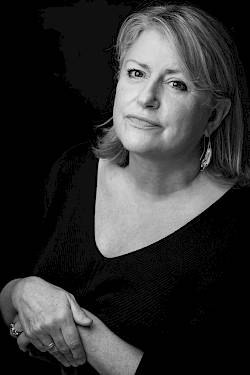
Emma Ryott,
Emma Ryott
Emma Ryott trained at Trent Polytechnic with a BA in Theatre Design. Ever since their first collaboration in 2003, Emma Ryott and Christian Spuck continued working together for ballet and opera productions, such as Lulu. Eine Monstretragödie in Stuttgart, Anna Karenina in Zurich, Oslo and Moscow, Romeo und Julia in Zurich, Woyzeck in Oslo and Zurich, Das Fräulein von S. in Stuttgart, Leonce und Lena in Montréal, Stuttgart und Zurich, Der Sandmann in Stuttgart und Zurich, Poppea / Poppea und Don Q. for Gauthier Dance, The Return of Ulysses for das Royal Ballet of Flanders, La Damnation de Faust at the Deutsche Oper Berlin, Falstaff in Wiesbaden and Orfeo ed Euridice in Stuttgart. She also works closely with director Keith Warner. Their collaborations include Mathis der Maler at Theater an der Wien, Manon Lescaut at the English National Opera as well as La Damnation de Faust and Harbison’s The Great Gatsby at the Semperoper Dresden. Other designs were created for Sunset Boulevard and Manon Lescaut (Goteborg), Otello (Salzburg), The Heart of Robin Hood for the Royal Shakespeare Company (awarded with Elliot Norton Award for outstanding design), Rock ‘n Roll by Tom Stoppard (London Royal Court, West End and Broadway), Chekhov-trilogy directed by Jonathan Kent (National Theatre, London) and the New Year’s Day Concert, Vienna, 2016.
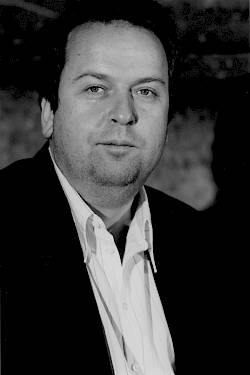
Reinhard Traub,
Reinhard Traub
Reinhard Traub absolvierte eine Ausbildung als Grafikdesigner und Berufspilot. Von 1980 bis 1985 war er Assistent bei Chenault Spence und gestaltete anschliessend u. a. zwei Welttourneen mit den Produktionen Sophisticated Ladies und Carmen Jones als Lichtdesigner. Seit 1992/93 war er bei den Bühnen Graz tätig und konzipierte Lichtdesigns für Produktionen an den Opernhäusern von Amsterdam, Zürich, Brüssel, Hamburg, Helsinki, Hongkong, Kopenhagen, London, Los Angeles, Madrid, Montreal, Moskau, München, Oslo, für die Salzburger Festspiele, das Glyndebourne Festival sowie für das Hamburger Thalia Theater, die Volksbühne Berlin und das Burgtheater in Wien. Reinhard Traub arbeitet regelmässig mit Regisseuren wie Johann Kresnik, Martin Kušej und Christof Loy zusammen. Seit 2006/07 ist Reinhard Traub Leiter der Beleuchtungsabteilung der Staatsoper Stuttgart. Dort ist er Lichtdesigner für Produktionen wie Jenůfa, Der Schaum der Tage, Ariadne auf Naxos, Nabucco sowie Die Nachtwandlerin, Platée, Der fliegende Holländer, Parsifal und La Bohème. 2017 war Reinhard Traub für das Lichtdesign der Produktion Aida bei den Salzburger Festspielen verantwortlich, ausserdem für Tristan und Isolde (2015), Parsifal (2016) und Lohengrin (2018) bei den Bayreuther Festspielen, denen er zukünftig bei Tannhäuser und Der Ring des Nibelungen verbunden sein wird. Darüber hinaus unterrichtet Reinhard Traub seit 2001 an der Staatlichen Akademie der Bildenden Künste in Stuttgart.
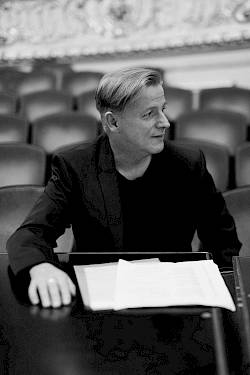
Michael Küster,
Michael Küster
Michael Küster stammt aus Wernigerode (Harz). Nach dem Studium der Germanistik, Kunst- und Sprechwissenschaft an der Universität Halle war er Moderator, Autor und Sprecher bei verschiedenen Rundfunkanstalten in Deutschland. Dort präsentierte er eine Vielzahl von Klassik-Programmen und Live-Übertragungen wichtiger Konzertereignisse, u. a. aus der Metropolitan Opera New York, der Semperoper Dresden und dem Leipziger Gewandhaus. Seit 2002 ist er Dramaturg am Opernhaus Zürich, u. a. für Regisseure wie Matthias Hartmann, David Alden, Robert Carsen, Moshe Leiser/ Patrice Caurier, Damiano Michieletto, David Pountney, Johannes Schaaf und Graham Vick. Als Dramaturg des Balletts Zürich arbeitete Michael Küster seit 2012 u. a. mit Cathy Marston, Marco Goecke, Marcos Morau, Edward Clug, Alexei Ratmansky, William Forsythe, Jiří Kylián und Hans van Manen, vor allem aber mit Christian Spuck zusammen (u. a. Romeo und Julia, Messa da Requiem, Winterreise, Dornröschen). An der Mailänder Scala war er Dramaturg für Matthias Hartmanns Operninszenierungen von Der Freischütz, Idomeneo und Pique Dame.
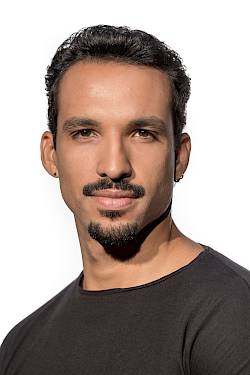
Cristian Alex Assis,
Cristian Alex Assis
Cristian Alex Assis is a native of Brazil. He studied at the Mannheim University of Music and Performing Arts, on a scholarship awarded by the Brasilia International Dance Seminar. He was a member of the Munich-based Bavarian State Ballet from 2010 to 2012, and came to Ballett Zürich for the 2012/13 season. Since then he has been seen in various roles including Wronski in Christian Spuck’s Anna Karenina, Tybalt in Spuck’s Romeo and Juliet and the drum major and the captain in Spuck’s Woyzeck, in further choreographies by William Forsythe andEdward Clug and in Martin Schläpfer’s Forellenquintett. In the reconstruction of Swan Lake by Alexei Ratmansky he was seen as Rotbart.
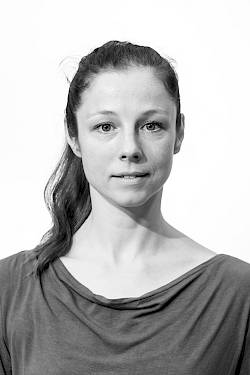
Eva Dewaele,
Eva Dewaele
Eva Dewaele is from Belgium. After completing training at the Royal Ballet School in Antwerp, she was engaged by the Hessisches Staatstheater Wiesbaden, the Theater Luzern, the Opera Göteborg, the Opéra de Lyon, the Cullberg Ballet and the Royal Ballet of Flanders. She has danced in choreographies by William Forsythe, Mats Ek and Jiří Kylián as well as in world premieres by Jacopo Godani, Douglas Lee, David Dawson and Christian Spuck. Eva Dewaele has also appeared in several feature films. With the start of the 2012/13 season she became a member of Ballett Zürich and was also ballet master of the Junior Ballett. She danced Lady Capulet in Christian Spuck’s Romeo und Julia, Rosetta in Leonce und Lena and the Dark Lady in Spuck’s Sonett. As a choreographer, Eva Dewaele created the piece Mit Blick auf for the Hodler retrospective of the Fondation Beyeler and presented the piece Miss(es) as a part of the «Junge Choreografen» series. Her choreography Passing by was created for the Junior Ballett. She has been a ballet master of Ballett Zürich since the 2014/15 season. She staged the production of Christian Spuck’s Anna Karenina at the Stanislavski Theatre in Moscow, the Korean National Ballet, and the Bayerisches Staatsballett.
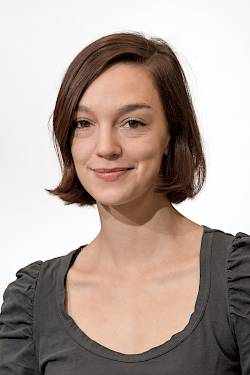
Juliette Brunner,
Juliette Brunner
Juliette Brunner, who is a native of Switzerland, trained at the Theater Basel Ballet School, at Brenda Hamlyn’s ballet school in Florence, under Malou Fenaroli in Zurich and at the School of American Ballet in New York. After dancing with the Düsseldorf/Duisburg-based Ballett am Rhein, the Leipzig Ballet and the Monte Carlo Ballet, she joined Ballett Zürich for the 2007/08 season. Since then she has been seen in leading roles in numerous productions including Heinz Spoerli’s Peer Gynt, Bella Figura, Wäre heute morgen und gestern jetzt, Orma, Abschied and Don Juan, Mats Ek’s Sleeping Beauty and William Forsythe’s The Vertiginous Thrill of Exactitude. Most recently she has danced the title role in Christian Spuck’s Anna Karenina, Lady Capulet in his Romeo and Juliet and the governess in his Leonce und Lena, along with choreographies by Martin Schläpfer, Wayne McGregor and Marco Goecke.
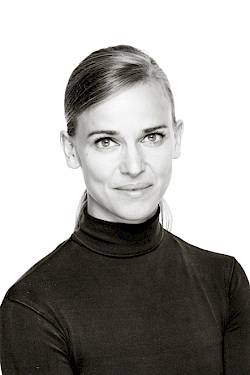
Katja Wünsche,
Katja Wünsche
Katja Wünsche comes from Dresden and was trained at the Staatliche Ballettschule Berlin. She has won prizes at numerous ballet competitions. From 1999 to 2012 she danced in the Stuttgart Ballet, including as a principal dance from 2006. She danced leading roles in choreographies by John Cranko (Romeo und Julia, Der Widerspenstigen Zähmung, Onegin), John Neumeier (Endstation Sehnsucht, Die Kameliendame), Marcia Haydée (Dornröschen, La Sylphide, La fille mal gardée) and Christian Spuck (Lulu, Der Sandmann, Leonce und Lena, Das Fräulein von S.) and ballets by Forsythe, Kylián, León/Lightfoot and Goecke. In 2007 she was awarded the German Dance Prize Future (for promising young artists) and the German Theater Prize Der Faust. Katja Wünsche has been a first soloist with Ballett Zürich since the 2012/13 season. She has been seen in Zurich as Julia in Spuck’s Romeo und Julia, Lena in Leonce und Lena, Marie in Woyzeck, Anna Karenina and Kitty in Anna Karenina and Clara in Der Sandmann. She has also performed in choreographies by Sol León/Paul Lightfoot, Douglas Lee, Martin Schläpfer, Wayne McGregor and Marco Goecke. In 2014 she was awarded the «Tanzpreis der Freunde des Balletts Zürich».
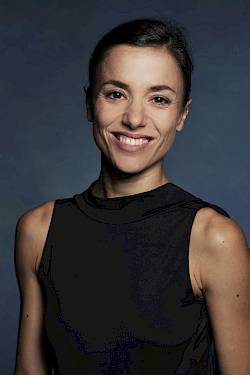
Giulia Tonelli,
Giulia Tonelli
Giulia Tonelli comes from Italy. She graduated from the Balletto di Toscana and the Ballet School of the Vienna State Opera. After her first engagement at the Vienna State Opera, she danced from 2002 to 2010 with the Royal Ballet of Flanders in Antwerp and from 2004 as a demi-soloist. There she danced Giselle (Petipa) as well as solo roles in choreographies of Forsythe, Balanchine, Kylián, Haydée and Spuck. She has been a member of Ballett Zürich since the 2010/11 season, where she has performed ballets by Spoerli, Goecke, McGregor, Lee, Forsythe, Kylián and Balanchine. She danced Julia in Christian Spuck’s Romeo und Julia, Lena in Spuck’s Leonce und Lena and Betsy in Anna Karenina. In Alexei Ratmansky’s Schwanensee reconstruction she danced in the Pas de trois and she also performed in Forsythe’s Quintett and Spuck’s Messa da Requiem. Last season’s highlights include Emergence by Crystal Pite and Gretchen in Edward Clug’s Faust. During the «Junge Choreografen» series she presented the works Mind Games and Klastos together with Mélissa Ligurgo. In 2013 she was awarded the Giuliana Penzi Prize. In 2017 she received the «Tanzpreis der Freunde des Balletts Zürich».
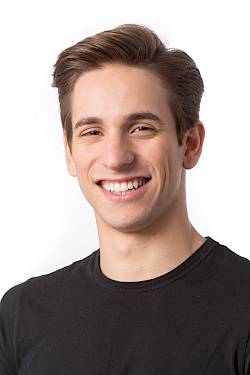
Denis Vieira,
Denis Vieira
Denis Vieira is from Brazil. A graduate of his home country’s Bolshoi Theatre School, he danced various roles for the Teatro Municipal in Rio de Janeiro including Onegin/Lensky in John Cranko’s Onegin, Romeo in Cranko’s Romeo and Juliet, Adam in Uwe Scholz’s Adam and Eve, Albrecht in Peter Wright’s Giselle and Prince Siegfried in Yelena Pankova’s Swan Lake. He joined Ballett Zürich in 2014, since when he has been seen in Schläpfer’s Forellenquintett, Kylián’s Wings of Wax, Kairos by Wayne McGregor and Sonett by Christian Spuck. He has also danced Tybalt and Romeo in Spuck’s Romeo and Juliet, Vronsky in his Anna Karenina, Leonce in his Leonce und Lena and Albrecht in Patrice Bart’s Giselle. He was also the recipient of the Friends of Ballett Zürich’s Dance Prize for 2015.
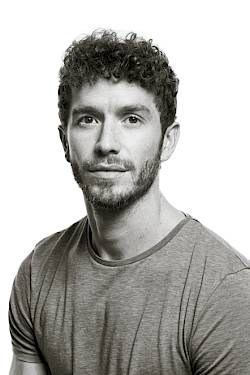
William Moore,
William Moore
William Moore is British and studied at the Royal Ballet School in London. He has won prizes at international ballet competitions. He has belonged to the Stuttgart Ballet since 2005 and was appointed as principal dancer there in 2010. Important roles were Siegfried in Schwanensee, Lensky in Onegin and Lucentio in Der Widerspenstigen Zähmung (all by John Cranko), Armand in Neumeier’s Kameliendame, Leonce in Christian Spuck’s Leonce und Lena, the title role in Marco Goecke’s Orlando, Albrecht in Giselle by Anderson/Savina, Colas in Ashton’s La fille mal gardée. In 2012 William Moore was awarded the German Theater Prize «Der Faust». Since the 2012/13 season he has been first soloist with Ballett Zürich. Important roles include Romeo in Spuck’s Romeo und Julia, Vronsky in Anna Karenina, the Nutcracker in Spuck’s Nussknacker und Mausekönig, Mephisto in Faust by Edward Clug, Petruschka in the choreography by Marco Goecke, and Diaghilev in Goecke’s Nijinski. He has also appeared in pieces by Wayne McGregor, Sol León/Paul Lightfoot, Douglas Lee, and Jiří Kylián. In 2018 he received the «Tanzpreis der Freunde des Balletts Zürich».
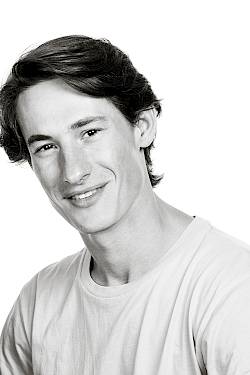
Alexander Jones,
Alexander Jones
Alexander Jones comes from Great Britain. He received his dance training at the Royal Ballet School in London. In 2004 he won the gold medal in the Adeline Genée Competition and the Dame Ninette de Valois Prize. In the 2005/06 season he became a member of the Stuttgart Ballet, where he was appointed principal dancer in 2011/12. In Stuttgart he has appeared as Armand Duval in Neumeier’s Kameliendame, Romeo in Cranko’s Romeo und Julia, in the title roles of Cranko’s Onegin and Kevin O’Days Hamlet, as Basilio in Maximiliano Guerra’s Don Quixote and in MacMillan’s Lied von der Erde. He has also danced in choreographies by Balanchine, Robbins, Ashton, Schaufuss, Tetley, Béjart, Haydée, van Manen, Forsythe, Lee, McGregor, Clug, and Spuck. Alexander Jones has been a first soloist of Ballett Zürich since the 2015/16 season. Here he has danced Prince Siegfried in Alexei Ratmansky’s Schwanensee reconstruction, Albrecht in Patrice Bart’s Giselle and Romeo in Romeo und Julia, Nathanael in Der Sandmann and Vronsky in Anna Karenina (all by Christian Spuck), among others.
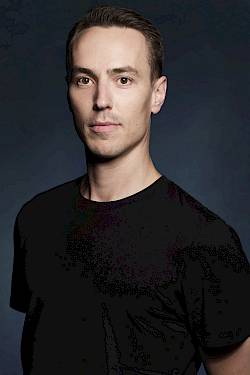
Daniel Mulligan,
Daniel Mulligan
Daniel Mulligan comes from Great Britain and studied at the Royal Ballet School in London. After two seasons with the Junior Ballett, he joined Ballett Zürich in the 2009/10 season. He has appeared as a soloist in many of Heinz Spoerli’s choreographies. He danced Mercutio/Benvolio in Christian Spuck’s Romeo und Julia as well as in ballets by Mats Ek (Dornröschen), Hans van Manen (Solo, Kammerballett), Edward Clug (Chamber Minds, Le Sacre du printemps), Sol León/Paul Lightfoot (Skew-Whiff, Speak for Yourself), William Forsythe (Quintett), Jiří Kylián (Gods and Dogs, Stepping Stones, Sweet Dreams), Ohad Naharin (Minus 16), Marco Goecke (Petruschka), Filipe Portugal (Corpus), Douglas Lee, and Crystal Pite. Recent leading roles have included Mephisto in Faust by Edward Clug, Fritz and the Clown in Spuck’s Nussknacker und Mausekönig, as well as Stiva in Spuck’s Anna Karenina.
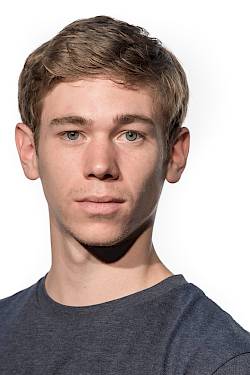
Benoît Favre,
Benoît Favre
Benoît Favre is from Switzerland, and trained at Neuchâtel’s Académie de Ballet and the Zurich Dance Academy. He has earned several awards at the Solothurn International Dance Competition (including a gold medal in 2010), and won gold at the Tanzolymp in Berlin. He was also a finalist (and won the Best Swiss Candidate Prize) at the 2011 Prix de Lausanne. After two years with the Junior Ballet, he joined the main Ballett Zürich company for the 2014/15 season. He has already been seen in a number of productions including Marco Goecke’s Deer Vision, and has presented his own works Shift and Identities under the company’s Young Choreographers programme. He won the Friends of Ballett Zürich Dance Prize for 2014; and earlier this year his work broken_line earned him the first-ever choreography prize at the Tanzolymp in Berlin.
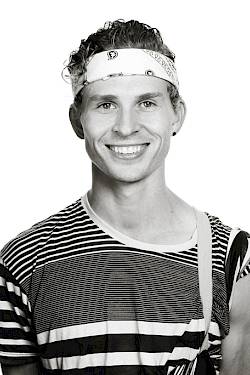
Tars Vandebeek,
Tars Vandebeek
Tars Vandebeek was born in Belgium, and studied at the Royal Ballet School of Antwerp. He won a gold medal at the International Competition of Dance in Biarritz, also earning the Biarritz City Award, and went on to perform for the Cannes Jeune Ballet and Gauthier Dance. After one year with the Junior Ballet, he joined the main company for the season 2014/15. He has already made a number of appearances on the Zurich stage, such as in Marco Goecke’s Deer Vision and as Levin in Christian Spuck’s Anna Karenina; and he danced the title role in Spuck’s Woyzeck.
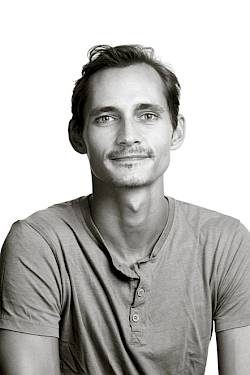
Dominik White Slavkovský,
Dominik White Slavkovský
Dominik White Slavkovský is Slovakian. Trained at the Bratislava Dance Conservatory, he danced for five years in the Ballet of the Slovak National Theater in Bratislava, most recently as a semi-soloist. He has been a member of Ballett Zürich since the 2014/15 season. In choreographies by Christian Spuck he performed the title role of "Woyzeck", as Drosselmeier in "Nutcracker and Mouse King", Coppelius in "The Sandman", Paris in "Romeo and Juliet" and as Death in Edward Clug's "Peer Gynt". He has also danced in choreographies by George Balanchine, Uwe Scholz, Alexei Ratmansky, Jiří Kylián, William Forsythe, Crystal Pite, Hans van Manen, Nacho Duato, Marco Goecke, James Kudelka, Vladimir Malakhov and many others. In the series "Young Choreographers" he showed his pieces "How to save the world", "Conspiracy" and "Boyband"
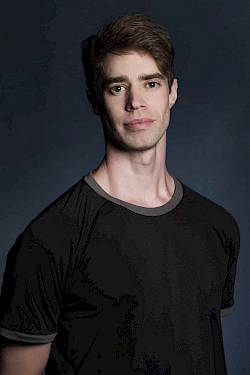
Jesse Fraser,
Jesse Fraser
Jesse Fraser was born in Saskatoon, Canada. He trained at the Royal Winnipeg Ballet School and became a member of the Stuttgart Ballet with the 2010/11 season. There he danced in choreographies by Cranko, MacMillan, Spuck, Haydée, Neumeier, Béjart, Forsythe, Cherkaoui, Goecke, Clug, Volpi, and Stiens. He created the choreographies Back and Forth and Second Self(ie) as a part of the «Young Choreographers» of the Noverre Society series. He has been a member of Ballett Zürich since the 2015/16 season. He has appeared as Paris in Christian Spuck’s Romeo und Julia, as Levin in Spuck’s Anna Karenina, as Hilarion in Patrice Bart’s Giselle, in Marco Goecke’s Petruschka and in choreographies by Jacopo Godani, Jiří Kylián, Hans van Manen, and Crystal Pite. In the 2019/20 season he appeared in Forsythe’s The Second Detail.
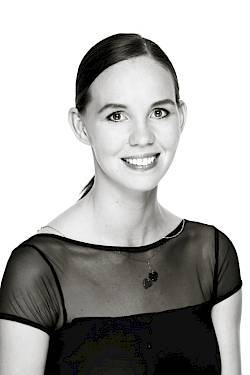
Viktorina Kapitonova,
Viktorina Kapitonova
Viktorina Kapitonova, who is a native of Russia, studied at the Kazan Ballet School and Moscow’s Bolshoi Theatre Academy. The winner of both the Young Ballet of Russia competition and the Arabesque contest of 2008, from 2005 onwards she danced at the Jalil Opera House in Kazan, performing solo roles in Swan Lake, The Sleeping Beauty, Don Quixote, La Bayadère, Coppélia and The Nutcracker. She was a member of the Stanislavsky Ballet for the 2008/09 season; and she joined Ballett Zürich in 2010, since when her performances have included Odette/Odile in Heinz Spoerli’s Swan Lake, solos in Spoerli’s A Midsummer Night’s Dream, Wäre heute morgen und gestern jetzt, ...und mied den Wind and Goldberg Variations, Rosetta in Christian Spuck’s Leonce and Lena, the nurse in Spuck’s Romeo and Juliet and the leading role in Spuck’s Anna Karenina. She has also been seen in choreographies by Balanchine, Ek, Forsythe, Kylián, Lee, McGregor and Schläpfer. She presented her choreography Two Bodies – One Soul as part of the company’s Young Choreographers programme. As Giselle/Myrtha she was seen in Patrice Bart’s Giselle, alongside Roberto Bolle and Friedemann Vogel. She was also the recipient of the Friends of Ballett Zürich’s Dance Prize for 2015. Last season her roles included Odette/Odile in the reconstruction of Swan Lake by Alexei Ratmansky as well as Olimpia in Christian Spuck’s Der Sandmann.
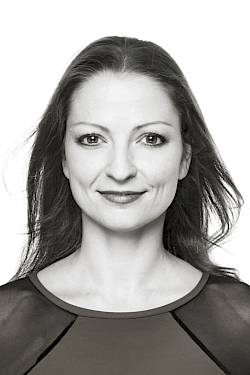
Galina Mihaylova,
Galina Mihaylova
The Bulgarian dancer Galina Mihaylova completed her education at the Bulgarian State Choreographic School and the Swiss Professional Ballet School, where she was a Nureyev Foundation scholarship holder. In the 1999/2000 season she became a member of the Ballett Zürich. She danced here in numerous choreographies by Heinz Spoerli. She has appeared as Effie (La Sylphide), Amor (Don Quixote), Helena (A Midsummer Night’s Dream), in Wäre heute morgen und gestern jetzt, as Odette/Odile (Swan Lake) and Henriette (Raymonda). She has also performed in ballets by William Forsythe, Jiří Kylián, Twyla Tharp, Uwe Scholz, and Jiří Bubeniček. She danced the Nurse in Romeo and Juliet, Margret in Woyzeck and Dolly in Anna Karenina (all by Christian Spuck). She has also appeared in choreographies by Wayne McGregor, Marco Goecke, and George Balanchine.
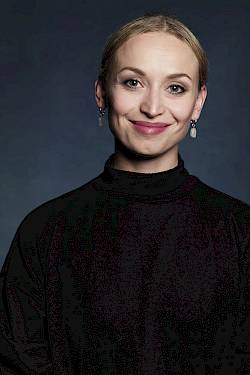
Irmina Kopaczynska,
Irmina Kopaczynska
Irmina Kopaczynska was born in Poland. She studied at the Polish National Ballet School Poznan. She won several prizes in the Polish National Ballet Competition. She also took part in the «Premio Roma» and the «Prix de Lausanne». After two seasons with the Junior Ballett, she became a member of Ballett Zürich starting with the 2011/12 season. She danced the Silver Fairy in Mats Ek’s Dornröschen, Betsy in Christian Spuck’s Anna Karenina, and the Nursemaid in Spuck’s Romeo und Julia. She has also appeared in choreographies by William Forsythe (In the middle, New Sleep), Hans van Manen (Kammerballett), Jiří Kylián (Gods and Dogs, Bella Figura), Iacopo Godani, Edward Clug, Marco Goecke (including the Mother in Nijinski), Douglas Lee, and Crystal Pite.


